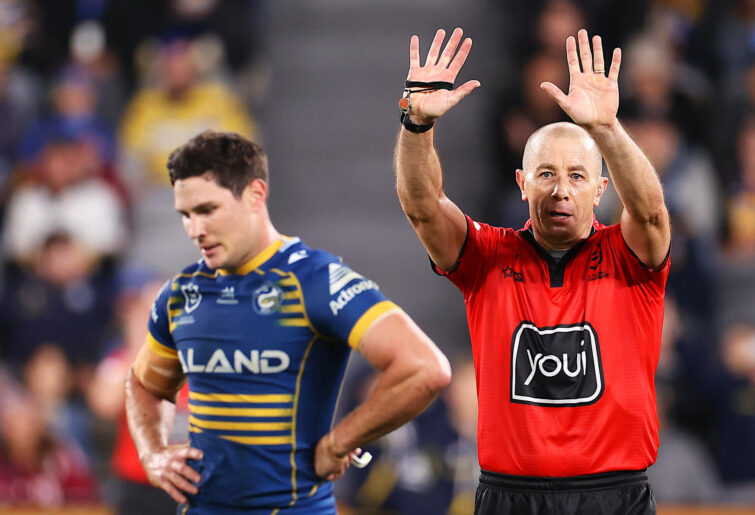
Recently the NRL released a powerful video featuring Ben Cummins, who has refereed over 400 games at the top level.
The video is about Cummins’ fifth NRL grand final in 2019 where he was officiating a game between the Canberra Raiders and Sydney Roosters and made an error which became the major talking point about the game.
The video discusses what happened on the field, but more importantly, what happened off it too. The immediate media attention and the impact it had on his family, including his children.
His son copped abuse at school as a result of a decision made on the footy field and his daughter faced the same challenges online.
As for Cummins, he didn’t leave the house for a week and he talks about the shame and embarrassment he felt following the game.
Much like many of us, Cummins loves rugby league. One of the reasons he decided to become a referee was so that he could become more involved with the game he loved so much.

(Photo by Mark Kolbe/Getty Images)
However, as we continue to see constant media focus on the ‘controversial calls’ which ‘cost’ teams every week and observe the brutal social media commentary that targets our officials, it begs the question, why would anyone want to be an NRL referee?
But these challenges aren’t only being felt at the elite level of our game, it’s happening at our grassroots too.
Sarah is part of a family that has always loved rugby league.
One day, her mother saw a post on Facebook about a ‘come and try’ session for refereeing at a junior level and she encouraged Sarah to give it a go. Whilst apprehensive at first, Sarah agreed to go to one session with a promise that if she did not like it she did not have to go back.
She left the first session early, feeling a bit overwhelmed, but something pushed her to go back a week later and try again.
In that session, Sarah had the opportunity to train with the referees. She loved it, has kept going since and now has done referees course and received her accreditation.
“I never played rugby league, but I loved watching it,” said Sarah.
“Being a referee was an opportunity to do something different because there aren’t too many people to put their hand up to do it.”
<div class="u-ml-md-3 u-mb-sm-2 u-mb-md-0 u-mt-sm-1 u-pl-sm-0 u-float-lg-right o-row o-col-12 o-col-md-6">
</div>
In her first year as a referee Sarah really enjoyed herself, despite the season being cut short due to COVID.
When the season resumed this year, so did Sarah and whilst she has continued to enjoy it, she has seen the negative side to refereeing and it has certainly impacted her.
“I think there is a culture in our game that tells us that it is okay to bag referees,” said Sarah.
“When you have a first grade coach who criticises the referees for a week after the game, that flows down and says to the junior coaches and players that this is okay and that it is something that they can do.
“We have a major shortage of referees at the moment and it has gotten to the point where we don’t referee some of the younger age groups because we don’t have enough people to fill those roles.”
An additional challenge is getting more young women involved in refereeing. Kasey Badger and Belinda Sharpe have both been incredible role models and demonstrated that there is a place and opportunity for women to referee at the highest level.
But Sarah has observed some of the female referees also being subject to bad behaviour from players and spectators.
<div style="text-align:center;padding:15px 5px 15px 5px;border:1px solid #E8E8E8;max-width:400px;margin-bottom:2.4rem;margin-left: auto;margin-right: auto">
<span style="font-size:1.9rem"><strong>Sports opinion delivered daily</strong> </span>
<p style="margin-bottom:8px"> </p>
</div>
function edmWidgetSignupEvent() {
window.roarAnalytics.customEvent({
category: 'EDM',
action: 'EDM Signup',
label: `Shortcode Widget`,
});
}
“Earlier this year I had a mother run onto the field towards me over an incident which should not even have been an incident,” said Sarah.
“I remember being upset but my parents were a big source of support.
“My mum insisted that I wasn’t going to quit over it and reminded me that incidents like this would help me to build my resilience.”
Sarah acknowledges that there are things that we can all do to improve the situation.
“In the junior league, the rules are so different to the NRL and I don’t think parents and spectators necessarily understand that,” said Sarah.
“There is an opportunity for us as a refereeing association to reach out to the parents and explain the rules.
“A lot more of this needs to happen in the community.”
As for Sarah, she isn’t going anywhere anytime soon.
“We need referees and sometimes the bad does outweigh the good, but I really do have so much fun when I’m out there,” said Sarah.
“I love the game of rugby league and I enjoy being on the field with the kids; who knows, one day they might play first grade and I can say that I was a small part of the journey.”

Leave a Reply